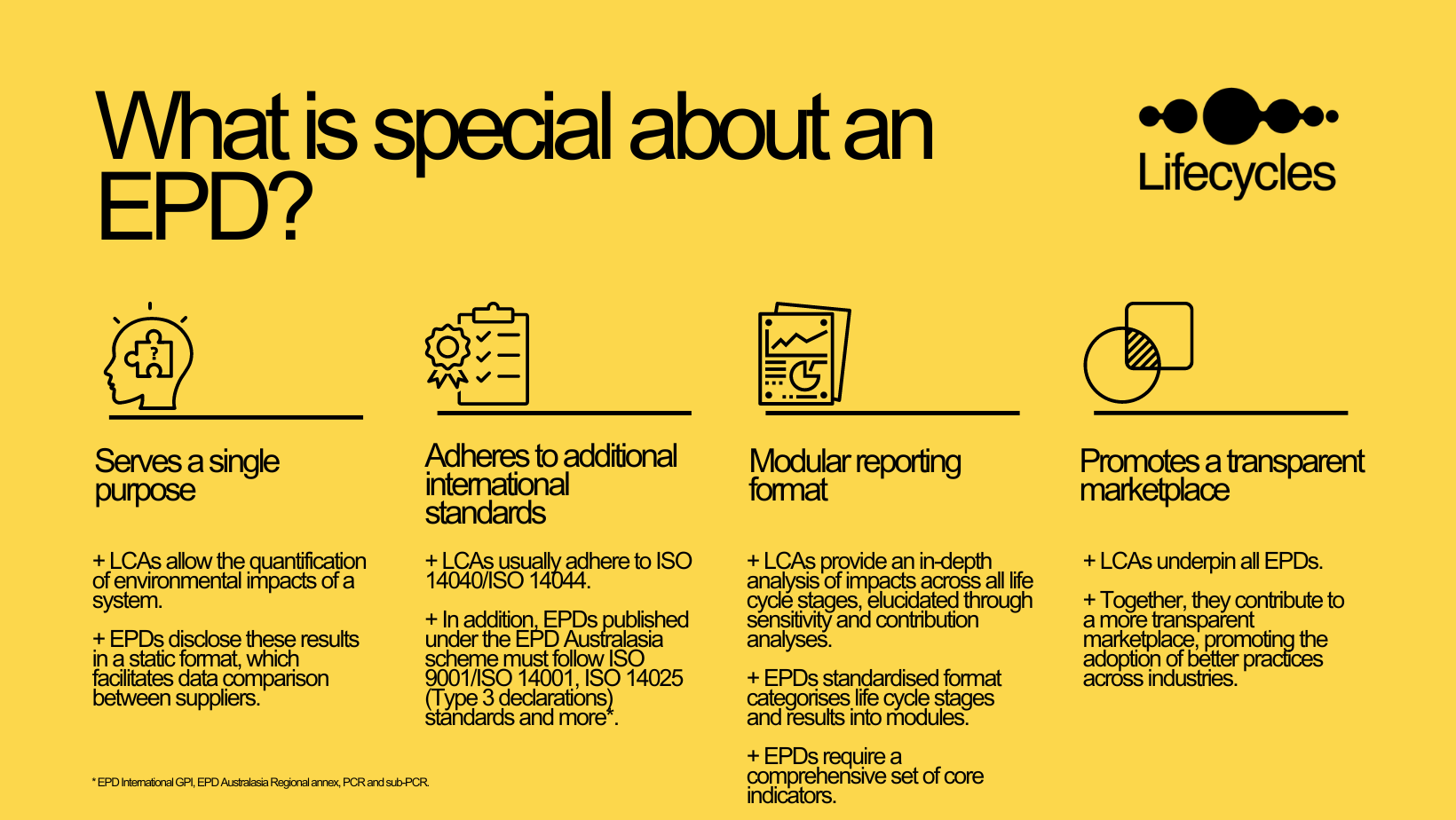A guide to understanding LCAs and EPDs
28th Mar 2024
Understanding the differences between Life Cycle Assessments (LCAs) and Environmental Product Declarations (EPDs)
Embarking on a sustainability journey can often feel like navigating a maze of acronyms and technical jargon. Amidst this complexity, terms like Environmental Product Declarations (EPDs) and Life Cycle Assessments (LCAs) can initially seem daunting. We asked Cathy Jiang, LCA Scientist at Lifecycles* to clarify the distinctions between standalone LCA studies and EPDs, emphasising their unique contributions to sustainable decision-making.
![]()
Author: Cathy Jiang, LCA Scientist, Lifecycles
Life Cycle Assessments (LCAs) and Environmental Product Declarations (EPDs) serve as crucial tools for evaluating and communicating the environmental impacts of products and services. Despite sharing the common goal of providing environmental information, these methodologies can differ in scope, purpose, and the information they provide.
LCAs, conducted in accordance with ISO 14040/44 standards, are comprehensive environmental evaluations that offer a systematic and quantitative assessment of a product’s environmental performance.
As LCA practitioners, we model various scenarios and conduct sensitivity analyses to contribute to the interpretation of results. This process offers a granular understanding of the origins and causes of environmental impacts. We assist clients in pinpointing opportunities for improvement across all stages of the life cycle.
While LCAs strive for consistency, practitioners face various methodological decisions, leading to a lack of uniformity and comparability in LCAs. EPDs on the other hand, follow a strict set of rules that guide the practitioner through these methodological decisions making it a stiffer tool but providing more consistent results. This is particularly valuable for comparing data between different suppliers.

Key differences
Purpose:
LCAs aim to quantify and analyse significant environmental impacts of a product/service system. They allow the product/service supplier to identify system improvement opportunities and assist sustainability decision-making.
EPDs aim to quantify and communicate the environmental performance of a specific product (or a range of similar products). They disclose these results to consumers and stakeholders, allowing them to choose suppliers based on environmental performance.
International standards:
ISO compliant LCAs provide a detailed analysis of environmental impacts, with a minimum adherence to ISO 14040/ISO 14044, and they can also comply with other relevant standards.
EPDs offer a standardised declaration of environmental performance. EPDs published under the EPD Australasia scheme must follow the following standards: ISO 9001/ISO 14001, ISO 14040/ISO 14044 (LCA standards), ISO 14025 (Type 3 declarations), citing EPD International GPI, EPD Australasia Regional annex, PCR and sub-PCR.
Reporting differences:
- Functional unit: In EPDs, it may be referred to as a declared unit, accommodating products that can fulfil various functions or be used for different purposes.
- Life cycle stages: The EPD life cycle stages and results are categorised into modules or groups, allowing for more standardised reporting.
- Sensitivity and contribution analyses: EPDs’ modularised format eliminates the need for a contribution analysis, and sensitivity analyses are not applicable as their purpose is to present the current environmental performance of the product rather than potential variations.
- Core indicators: EPDs must include a wide range of core indicators such as global warming, acidification, eutrophication, photochemical ozone creation, ozone depletion, abiotic depletion of minerals/metals, abiotic depletion of fossil fuels, as well as primary energy use and resource use, and waste and output flows depending on the product category. LCAs can choose any number or type of environmental indicators as desired, and relevant to the study, regardless of the product type.
Use in decision-making:
LCAs are used across all sectors of the economy in making informed decisions for reducing environmental impacts. LCAs have various applications, including comparative assertions, hotspot analyses as well as external claims.
EPDs are so far, especially in Australia, used mostly within the construction sector. They assist consumers, architects, and other stakeholders in making sustainable choices by comparing the environmental performance of similar products available on the market.
In summary, while LCAs offer a detailed understanding of the environmental impact of a product or service, EPDs play a crucial role in communicating this information to consumers and facilitating sustainable decision-making at the consumer level. Together, LCAs and EPDs contribute to a more transparent marketplace and promote the adoption of environmentally friendly practices across actors of the economy.
Further information
*Lifecycles is an experienced provider of circular economy and sustainability research, consulting, tool development, emission factors and training. They provide quantification and metrics to inform sustainability decision making, from the micro level of design and material selection through to the macro level of policy development and strategic interventions. Visit their website.
Latest News
EPDs in Transport Infrastructure: A Path to Sustainability with NTRO
The National Transport Research Organisation (NTRO) is championing a resilient and sustainable future through innovative research and practical solutions to transport infrastructure challenges....
A guide to understanding LCAs and EPDs
Understanding the differences between Life Cycle Assessments (LCAs) and Environmental Product Declarations (EPDs) Embarking on a sustainability journey can often feel like navigating...
Leading the way in sustainable procurement on infrastructure projects
This month, we’re delighted to feature Ross Brookshaw, Sustainability Manager of the M80 Ring Road Alliance, as our guest author. Ross brings a...